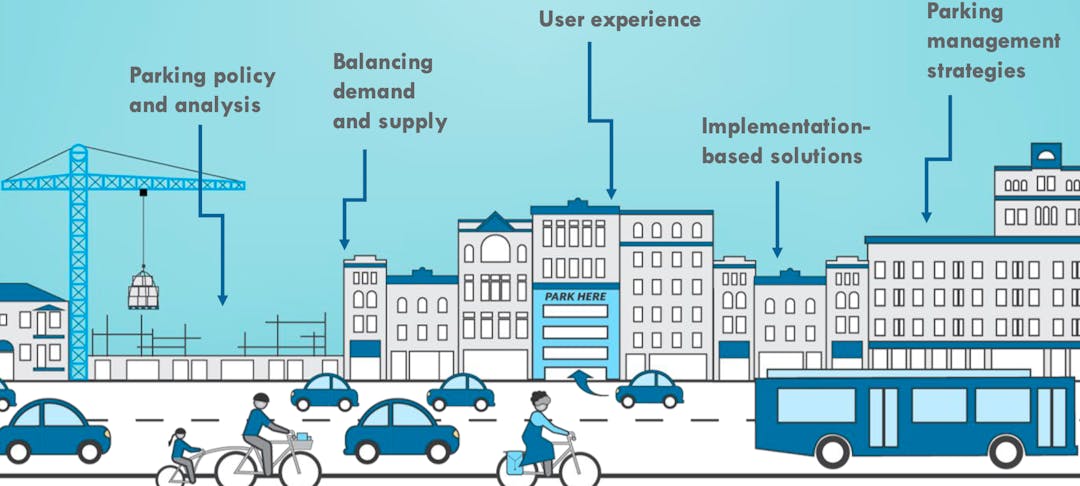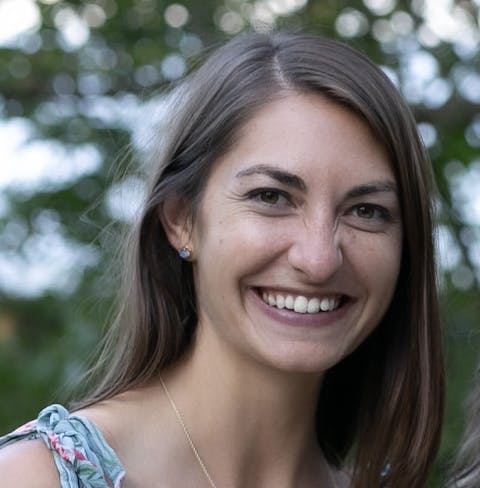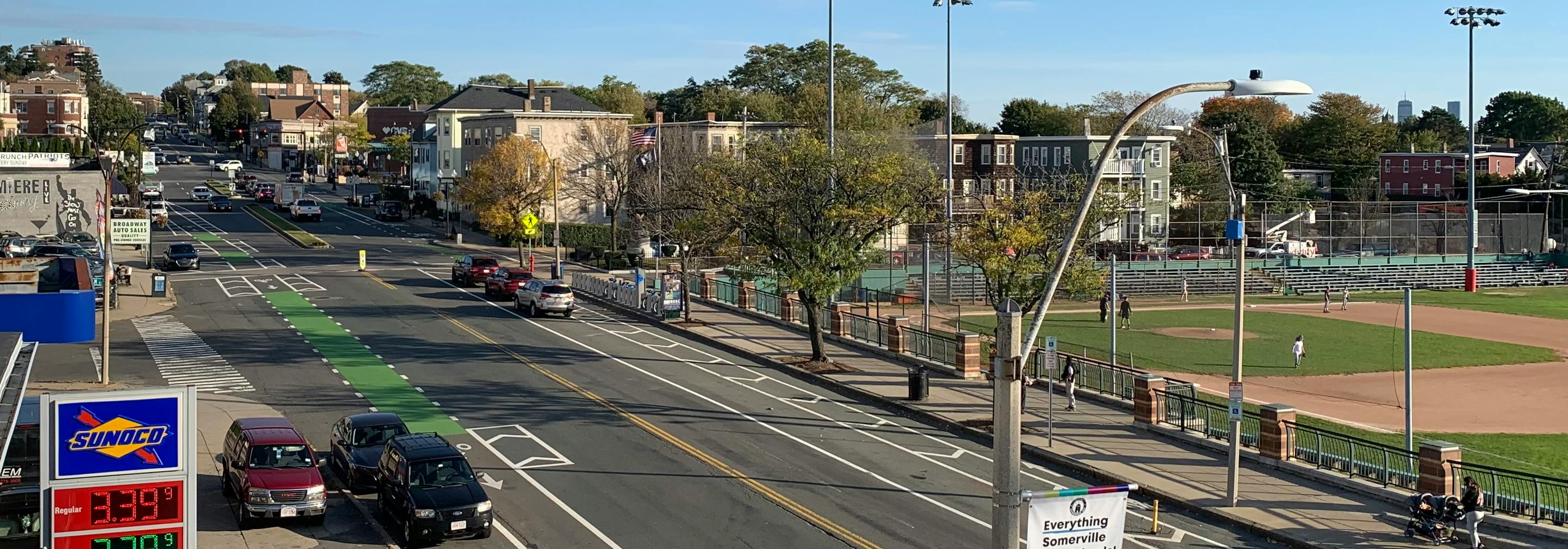Citywide Parking & Curb Use Study

The Citywide Parking & Curb Use Study is an effort to comprehensively understand the parking system in Somerville and make recommendations that will guide the City in bringing its parking policies in alignment with its city goals, community values, and future needs.
The city is seeking recommendations that will:
- Enhance mobility and access, improve the equity, safety, dependability, and sustainability of our transportation system, reduce our reliance on automobiles, allow for growth with less parking, and satisfy parking demand to the extent feasible and practical, recognizing that the city’s mode shift and climate goals will require less space dedicated toContinue reading
The Citywide Parking & Curb Use Study is an effort to comprehensively understand the parking system in Somerville and make recommendations that will guide the City in bringing its parking policies in alignment with its city goals, community values, and future needs.
The city is seeking recommendations that will:
- Enhance mobility and access, improve the equity, safety, dependability, and sustainability of our transportation system, reduce our reliance on automobiles, allow for growth with less parking, and satisfy parking demand to the extent feasible and practical, recognizing that the city’s mode shift and climate goals will require less space dedicated to vehicle parking.
- Reduce the annoyance and frustration associated with parking by making our parking system easier to understand and work more equitably, efficiently, and consistently for residents, businesses, and visitors.
- Prioritize our limited parking resources for persons with limited mobility options due to financial reasons, mobility impairments, disabilities, or other hardships, and disincentivize those with broad choice among mobility options from using limited parking resources.
- Ensure that any changes to parking policy are equitable and that recommendations include appropriate mitigation strategies for potential unequal burdens on specific disadvantaged populations.
The study will utilize and leverage data from a complete inventory of parking regulations on city streets and parking utilization counts from select areas across the city. It will include an evaluation of current enforcement/payment technologies as well as analysis of current parking supply and demand. Recommendations and an implementation action plan will be developed to reduce and distribute demand, expand capacity and supply, ensure equitable access, and improve administration and operation.
The study will be informed by public and expert input, as well as the Parking Study Task Force - a 21 member group consisting of representatives from City Council, the business community, the Council on Aging, the Commission for Persons with Disabilities, the Pedestrian & Transit Advisory Committee, the Bicycle Advisory Committee, and many city departments (Parking, Police, Fire, Racial & Social Justice, Sustainability & Environment, Engineering, Economic Development, Planning & Zoning, and Mobility).
-
Mayor Katjana Ballantyne and City staff invite you to read and discuss the Citywide Parking & Curb Use Final Report
Share Mayor Katjana Ballantyne and City staff invite you to read and discuss the Citywide Parking & Curb Use Final Report on Facebook Share Mayor Katjana Ballantyne and City staff invite you to read and discuss the Citywide Parking & Curb Use Final Report on Twitter Share Mayor Katjana Ballantyne and City staff invite you to read and discuss the Citywide Parking & Curb Use Final Report on Linkedin Email Mayor Katjana Ballantyne and City staff invite you to read and discuss the Citywide Parking & Curb Use Final Report linkMeeting flyers available English, Español, Português, Kreyòl Ayisyen, नेपाली, 简体中文版, 繁體中文版.
Mayor Katjana Ballantyne and City staff invite you to discuss the Citywide Parking & Curb Use Study Final Report. Please check out the final report available now on project website.

Join the project team to learn more about:
- An overview of the final report
- Parking and curb policy key issues and opportunities
- Curb management strategies
- Public input on draft study recommendations
- And next steps for the City of Somerville
The virtual community meeting will take place on Wednesday, October 19, 6:00 pm - 7:30 pm.
Register for the meeting at https://us06web.zoom.us/webinar/register/WN_7OQjWsMGQbCtcLDoYiOTqw
To join by phone:
- One tap mobile: US: +13017158592,,85769718085# or +13126266799,,85769718085#
- Or dial a number based on your current location and use the Webinar ID
- For higher quality, dial a number based on your current location.
US: +1 646 558 8656 or +1 301 715 8592 or +1 312 626 6799 or +1 720 707 2699 or +1 253 215 8782 or +1 346 248 7799 - Webinar ID: 857 6971 8085
- For higher quality, dial a number based on your current location.
For any questions, please email transportation@somervillema.gov
Interpretation into Spanish, Portuguese, Haitian Kreyol, Nepali, Mandarin, and Cantonese may be available upon advance request by contacting the SomerViva Office of Immigrant Affairs at somerviva@somervillema.gov or calling 311 at 617-666-3311.
Persons with disabilities who need auxiliary aids and services for effective communication (i.e., CART, ASL), written materials in alternative formats, or reasonable modifications in policies and procedures in order to access the programs, activities, and meetings of the City of Somerville should please contact Adrienne Pomeroy at 617-625-6600 x 2059 or ADA@somervillema.gov.
-
Share your feedback about the study recommendations in our survey!
Share Share your feedback about the study recommendations in our survey! on Facebook Share Share your feedback about the study recommendations in our survey! on Twitter Share Share your feedback about the study recommendations in our survey! on Linkedin Email Share your feedback about the study recommendations in our survey! linkIn June 2022, the study project team shared curb regulations and occupancy data collected, key findings from data analysis, and potential policy and operations recommendations.
Check out the recording and presentation slides from that meeting.
We now want to hear from you about your feedback on the proposed recommendations to help guide the City in bringing its parking policies in alignment with city goals, community values, and future needs.
Please take a short survey available in:
You can also submit a comment in the comment box, or email Jackie Stagnari at jstagnari@somervillema.gov, to let us know your thoughts. If you need help taking the survey contact 311(617-666-3311).
-
Join the project team to learn more about study findings!
Share Join the project team to learn more about study findings! on Facebook Share Join the project team to learn more about study findings! on Twitter Share Join the project team to learn more about study findings! on Linkedin Email Join the project team to learn more about study findings! linkMeeting flyers available English, Español, Portugues, Kreyòl Ayisyen.
Mayor Katjana Ballantyne and City staff invite you to discuss the Citywide Parking & Curb Use Study Findings.
Join the project team to learn more about:
- Curb regulations and occupancy data collected;
- Key findings from data analysis;
- Potential policy and operations recommendations to guide the City in bringing its parking policies in alignment with city goals, community values, and future needs.
Provide your feedback on the proposed recommendations to help inform next steps to policy changes.
There are two options to attend a virtual meeting:
Virtual Meeting - Evening
Date: Monday, June 27
Time: 6:00 pm - 7:30 pm
Virtual Meeting Link: https://us06web.zoom.us/webinar/register/WN_6WCbbJ1BSFSWaSi1GTrYeg
To join by phone:
- One tap mobile: US: +13017158592,,83979791163# or +13126266799,,83979791163#
- Or dial a number based on your current location and use the Webinar ID
- For higher quality, dial a number based on your current location.
US: +1 646 558 8656 or +1 301 715 8592 or +1 312 626 6799 or +1 720 707 2699 or +1 253 215 8782 or +1 346 248 7799 - Webinar ID: 839 7979 1163
- For higher quality, dial a number based on your current location.
Virtual Meeting - Daytime
Date: Wednesday, June 29
Time: 12:00 pm - 1:30 pm
Virtual Meeting Link: https://us06web.zoom.us/webinar/register/WN_MLOsS2_qQlqvfrCxLy2Ptw
To join by phone:
- One tap mobile: US: +13126266799,,89121553166# or +16465588656,,89121553166#
- Or dial a number based on your current location and use the Webinar ID
- For higher quality, dial a number based on your current location.
US: +1 646 558 8656 or +1 301 715 8592 or +1 312 626 6799 or +1 720 707 2699 or +1 253 215 8782 or +1 346 248 7799 - Webinar ID: 891 2155 3166
- For higher quality, dial a number based on your current location.
For any questions, please email transportation@somervillema.gov
Interpretation into Spanish, Portuguese, Haitian Kreyol, or Nepali may be available upon advance request by contacting the SomerViva Office of Immigrant Affairs at somerviva@somervillema.gov or calling 311 at 617-666-3311.
Persons with disabilities who need auxiliary aids and services for effective communication (i.e., CART, ASL), written materials in alternative formats, or reasonable modifications in policies and procedures in order to access the programs, activities, and meetings of the City of Somerville should please contact Adrienne Pomeroy at 617-625-6600 x 2059 or ADA@somervillema.gov.
-
Study Update: Existing Conditions and Curb Profile
Share Study Update: Existing Conditions and Curb Profile on Facebook Share Study Update: Existing Conditions and Curb Profile on Twitter Share Study Update: Existing Conditions and Curb Profile on Linkedin Email Study Update: Existing Conditions and Curb Profile linkThe Citywide Parking and Curb-Use study continues. Over the winter, our project team continued to collect existing conditions data, including curbside regulation information for every public curb in the city and occupancy data for selected streets at different times of the day in each neighborhood to inform the Curb Profile. The Curb Profile is an assessment of the characteristics of curbs and on-street parking in distinct areas of the city. The Parking Study Taskforce met twice this spring to learn about the development of the Curb Profile and provide feedback on the framework for modeling parking demand to inform study recommendations. Learn more about the updates through the summary below or dive into the data collection in the Curb Profile.
At the outset of the study, the Task Force worked with the consultant team to put together a list of goals. These goals include maximizing the effectiveness of the curb, improving pickup/drop-off safety and efficiency, improving commercial loading availability, decreasing drive alone mode share to further decarbonizations goals, expanding and improving safe walking and biking options, improving transit performance and access, advancing equity goals, and centering people in our public space These goals shaped the approach to data collection and will inform any policy recommendations.
Existing Conditions
The project team gathered information on the supply, regulation, and use of Somerville’s approximately 24,000 on-street parking spaces and curbs. Field data was collected for every curb in Somerville in order to establish a complete Curb Inventory that documents the supply of curb spaces, how they are regulated, and the presence of specific street assets such as fire hydrants, parking signs, curb cuts, and crosswalks.
Curb utilization data was collected in the field in key areas throughout the city to determine the demand for on-street parking. In order to observe peak parking conditions, utilization data was collected on early weekday mornings in residential areas when residential parking is busiest. In commercial areas, data was collected on both weekdays and weekends from 12 PM – 8 PM when these areas are busiest and when metered parking is in effect. Utilization in mixed residential and commercial areas was also collected on weekdays from 10 AM – 6 PM to determine how daytime commercial demand impacts residential parking.
Analyzing current curb use conditions in the city along with permit data, the project team found that 52% of Somerville’s curb space is dedicated to parking or loading for vehicles. Another 19% is used as driveway curb cuts totaling 71% of potential curb space being allocated solely to vehicles.
The vast majority (73%) of the 25,100 vehicle-accessible curb spaces in Somerville are primarily regulated to accommodate resident parking (Resident Permit Parking). Although only 36.7% of Somerville residents drive alone to work, 76% of households own vehicles.
Somerville’s resident-permit spaces averaged 67% utilization across the city during overnight-peak occupancy counts. However, this varies between neighborhoods and among individual blocks. During daytime periods, these spaces averaged 57% utilization, indicating that many residents do not drive their vehicles daily.
The number of registered resident permits exceeds this supply by a ratio of 2.5 permits per space. Union Square, Prospect Hill, Duck Village, and East Somerville have the highest ratios of permits to space. In contrast, Magoun Square and Winter Hill feature only 2.2 permits per space, and observed utilization demonstrates that parking is less full in these areas. Areas with higher ratios of permits to spaces were observed to be fuller (70% full in Union Square and Prospect Hill) while areas with fewer permits were less full (59% full in Winter Hill).
Specialty permit programs such as Business Permits and School Permits facilitate parking for employees traveling into the city. Time-limited parking is used to share parking resources between residents and visitors in commercial areas and is highly utilized during the day in most areas where it exists. The density of resident permits per household strongly tracks with patterns of high-density and concentrations of low-income housing. Areas like East Somerville and Duck Village, where housing is dense and incomes are low, show the highest concentration of permits.
Parking Personas
People get around in different ways and delivery services continue to grow. The project team developed a set of personas to capture how this diversity might affect responsiveness to parking and mobility policy changes among Somerville residents, employees, and visitors. These personas do not encompass all our community's identities but gives us a representation of the variety of our community members. We can then look at potential needs and behaviors of these personas and model how different actions might impact them. Learn more about the personas identified in the Curb Profile.
Public Survey Results
Following the virtual public meetings held in November, the project team released an online survey from December 2021 to February 2022. We received over 1,700 responses. The input shared in the survey along with comments from the public meeting, emailed comments, and input heard at outreach events, in addition to the findings will serve as the basis for recommendations development in the final stages of the study. Summaries of the survey responses will be presented at the next public meeting. You can also review the survey summary report.
Next Steps
The project team, in collaboration with the Task Force, will continue to put together a series of recommendations to be presented to City staff and the public. We will host another public meeting this summer to present those recommendations and gather feedback. Subscribe to email updates to receive an email notification for the next virtual public meeting in the coming weeks. Meeting information will be posted to this project website and City Calendar.
-
Take the Citywide Parking & Curb-Use Study! (Deadline January 14, 2022)
Share Take the Citywide Parking & Curb-Use Study! (Deadline January 14, 2022) on Facebook Share Take the Citywide Parking & Curb-Use Study! (Deadline January 14, 2022) on Twitter Share Take the Citywide Parking & Curb-Use Study! (Deadline January 14, 2022) on Linkedin Email Take the Citywide Parking & Curb-Use Study! (Deadline January 14, 2022) linkThe City of Somerville invites Somerville residents, workers, and visitors to take a survey to inform citywide parking policies.
Survey in English, Español, Português, Kreyòl Ayisyen, and नेपाली.
This survey will provide vital insights into existing travel patterns and public priorities for parking management and curbside space. It is one component of the Citywide Parking and Curb-Use Study, a multipronged effort to collect data and develop recommendations to make Somerville’s parking system work more equitably, efficiently, and consistently for residents, businesses, and visitors.
Responses will be accepted through January 14, 2022.
Who's Listening
-
JS
-

-

Email kwhite@somervillema.gov
Important Documents
-
 Parking Study Task Force Meeting - Sept 2021 (6.25 MB) (pdf)
Parking Study Task Force Meeting - Sept 2021 (6.25 MB) (pdf)
-
 Somerville Residents - Means of Transportation to Work (94.2 KB) (pdf)
Somerville Residents - Means of Transportation to Work (94.2 KB) (pdf)
-
 Citywide Parking & Curb-Use Study Community Meeting 1 Presentation Slides.pdf (8.62 MB) (pdf)
Citywide Parking & Curb-Use Study Community Meeting 1 Presentation Slides.pdf (8.62 MB) (pdf)
-
 CurbStudy_Community_Meeting_1_Menti_Questions_Session1.pdf (245 KB) (pdf)
CurbStudy_Community_Meeting_1_Menti_Questions_Session1.pdf (245 KB) (pdf)
-
 CurbStudy_Community_Meeting_1_Menti_Questions_Session2.pdf (2.49 MB) (pdf)
CurbStudy_Community_Meeting_1_Menti_Questions_Session2.pdf (2.49 MB) (pdf)
-
 Somerville Curb Profile (13.4 MB) (pdf)
Somerville Curb Profile (13.4 MB) (pdf)
-
 Curb Use and Parking Study Survey Responses Summary Report (1.48 MB) (pdf)
Curb Use and Parking Study Survey Responses Summary Report (1.48 MB) (pdf)
-
 Public Meeting Flyers
Public Meeting Flyers
-
 Second Citywide Parking & Curb Use Study Community Meeting Flyer (Spanish) (476 KB) (pdf)
Second Citywide Parking & Curb Use Study Community Meeting Flyer (Spanish) (476 KB) (pdf)
-
 Second Citywide Parking & Curb Use Study Community Meeting Flyer (Haitian Kreyol) (476 KB) (pdf)
Second Citywide Parking & Curb Use Study Community Meeting Flyer (Haitian Kreyol) (476 KB) (pdf)
-
 Second Citywide Parking & Curb Use Study Community Meeting Flyer (Portuguese) (1.42 MB) (pdf)
Second Citywide Parking & Curb Use Study Community Meeting Flyer (Portuguese) (1.42 MB) (pdf)
-
 Citywide Parking & Curb Use Study Findings Community Meeting Flyer (English) (476 KB) (pdf)
Citywide Parking & Curb Use Study Findings Community Meeting Flyer (English) (476 KB) (pdf)
-
-
 Citywide Curb-Use and Parking Public Meeting #2 Presentation Slides (5.96 MB) (pdf)
Citywide Curb-Use and Parking Public Meeting #2 Presentation Slides (5.96 MB) (pdf)
-
 Draft Somerville Curb and Parking Recommendations June 2022 (3.99 MB) (pdf)
Draft Somerville Curb and Parking Recommendations June 2022 (3.99 MB) (pdf)
-
 Recommendations Survey Flyers
Recommendations Survey Flyers
-
 Parking Study Recommendations Survey Flyer (English).pdf (533 KB) (pdf)
Parking Study Recommendations Survey Flyer (English).pdf (533 KB) (pdf)
-
 Parking Study Recommendations Survey Flyer (Haitian Creole).pdf (532 KB) (pdf)
Parking Study Recommendations Survey Flyer (Haitian Creole).pdf (532 KB) (pdf)
-
 Parking Study Recommendations Survey Flyer (Nepali).pdf (538 KB) (pdf)
Parking Study Recommendations Survey Flyer (Nepali).pdf (538 KB) (pdf)
-
 Parking Study Recommendations Survey Flyer (Portuguese).pdf (532 KB) (pdf)
Parking Study Recommendations Survey Flyer (Portuguese).pdf (532 KB) (pdf)
-
 Parking Study Recommendations Survey Flyer (Simplified Chinese).pdf (729 KB) (pdf)
Parking Study Recommendations Survey Flyer (Simplified Chinese).pdf (729 KB) (pdf)
-
 Parking Study Recommendations Survey Flyer (Spanish).pdf (532 KB) (pdf)
Parking Study Recommendations Survey Flyer (Spanish).pdf (532 KB) (pdf)
-
 Parking Study Recommendations Survey Flyer (Traditional Chinese).pdf (744 KB) (pdf)
Parking Study Recommendations Survey Flyer (Traditional Chinese).pdf (744 KB) (pdf)
-
-
 Final Report Materials
Final Report Materials
-
 Citywide Parking & Curb-Use Policy Final Report (5.94 MB) (pdf)
Citywide Parking & Curb-Use Policy Final Report (5.94 MB) (pdf)
-
 Third Citywide Parking & Curb Use Study Community Meeting Flyer (English).pdf (1.05 MB) (pdf)
Third Citywide Parking & Curb Use Study Community Meeting Flyer (English).pdf (1.05 MB) (pdf)
-
 Third Citywide Parking & Curb Use Study Community Meeting Flyer (Spanish).pdf (1.27 MB) (pdf)
Third Citywide Parking & Curb Use Study Community Meeting Flyer (Spanish).pdf (1.27 MB) (pdf)
-
 Third Citywide Parking & Curb Use Study Community Meeting Flyer (Haitian Creole) (1.66 MB) (pdf)
Third Citywide Parking & Curb Use Study Community Meeting Flyer (Haitian Creole) (1.66 MB) (pdf)
-
 Third Citywide Parking & Curb Use Study Community Meeting Flyer (Nepali) (1.68 MB) (pdf)
Third Citywide Parking & Curb Use Study Community Meeting Flyer (Nepali) (1.68 MB) (pdf)
-
 Third Citywide Parking & Curb Use Study Community Meeting Flyer (Simplified Chinese) (1.91 MB) (pdf)
Third Citywide Parking & Curb Use Study Community Meeting Flyer (Simplified Chinese) (1.91 MB) (pdf)
-
 Third Citywide Parking & Curb Use Study Community Meeting Flyer (Traditional Chinese) (1.32 MB) (pdf)
Third Citywide Parking & Curb Use Study Community Meeting Flyer (Traditional Chinese) (1.32 MB) (pdf)
-
 Third Citywide Parking & Curb Use Study Community Meeting Flyer (Portuguese) (1.27 MB) (pdf)
Third Citywide Parking & Curb Use Study Community Meeting Flyer (Portuguese) (1.27 MB) (pdf)
-
-
 Citywide Parking and Curb Use Study Community Meeting #3 Presentation Slides (6.5 MB) (pdf)
Citywide Parking and Curb Use Study Community Meeting #3 Presentation Slides (6.5 MB) (pdf)
-
 Citywide Parking Curb Use Study Recommendations Feedback Survey Report Fall 2022 (461 KB) (pdf)
Citywide Parking Curb Use Study Recommendations Feedback Survey Report Fall 2022 (461 KB) (pdf)
Videos
-
 Click here to play video
Citywide Parking & Curb Use Study Community Meeting #1 Daytime Session
Click here to play video
Citywide Parking & Curb Use Study Community Meeting #1 Daytime Session
-
 Click here to play video
Citywide Parking & Curb Use Study Community Meeting #1 Evening Session
Click here to play video
Citywide Parking & Curb Use Study Community Meeting #1 Evening Session
-
 Click here to play video
Citywide Parking & Curb-Use Study Meeting #2 June 27, 2022
Click here to play video
Citywide Parking & Curb-Use Study Meeting #2 June 27, 2022
-
 Click here to play video
Citywide Parking & Curb-Use Study Meeting #2 June 29, 2022
Click here to play video
Citywide Parking & Curb-Use Study Meeting #2 June 29, 2022
-
 Click here to play video
Citywide Parking Study Business Town Hall 7.27.22
Click here to play video
Citywide Parking Study Business Town Hall 7.27.22



